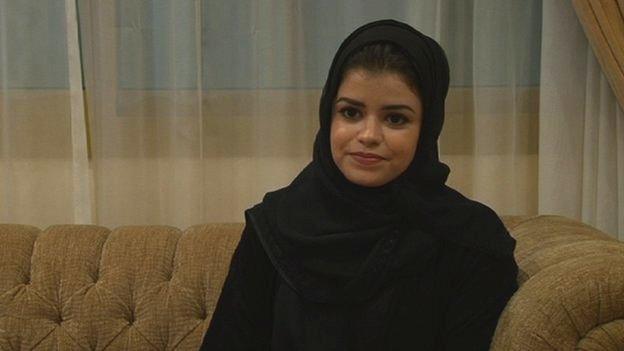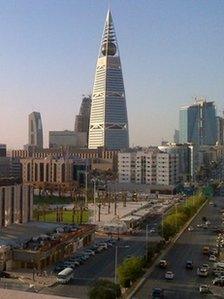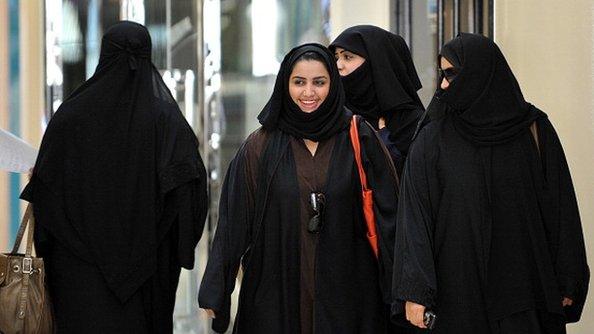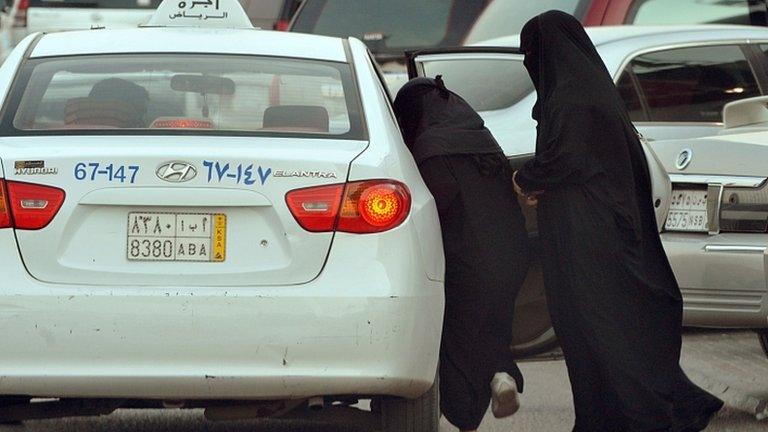Winning the case for women in work: Saudi Arabia's steps to reform
- Published

Pioneering Jamila Al-Shalhoub was one of the first women to study law at her university
Sitting on a fifth of the world's oil reserves, Saudi Arabia has seen a rapid transformation from desert to developed economy. But despite the modernisation of Riyadh, Saudi society is ruled by conservatism and tradition.
Women are banned from driving in the kingdom - despite protests last year by activists hoping to force change - and they need permission from a close male relative to be able to do simple things like travel or work.
But it is the workplace that is becoming the leading edge of change. Last year, King Abdullah, who is seen as a cautious reformist when it comes to women's rights, ordered that no longer would women have to buy underwear from male shop assistants - lingerie shops would be staffed by women. Jewellery shops and those selling abayas - the long black robes that women have to wear in the kingdom - will also go through the same process of hiring women.
These are seen as huge leaps forward for the ultra-conservative kingdom. Despite the fact that it spends heavily on educating both men and women - 60% of those who graduate from Saudi's universities are female - only 17% of women are actually in the job market. That compares with 75% of men.
Legal battle
26-year-old Jamila's friends and family call her a pioneer - she was one of the first women to study law at her university. When she started her degree, she knew her career options were limited because female lawyers were not allowed to plead cases in court - but she has been encouraged by a recent announcement that will soon allow her to practise law on an equal footing to men.
"I just thought it would be an amazing thing to be a part of something that I could change," she says. "It was hard at first, everyone was against us, everyone was criticizing us saying that 'you guys are just wasting your time, this isn't something that's going to help you in the future. I guess we just proved them wrong."

Khalid AlKhudair of Glowork recruitment: Being a man makes championing women's rights easier
The move has also been welcomed by law firms in the kingdom. But to comply with the law, they need to have separate offices for women - and that means finding the space - and the money - to build segregated areas. Despite the costs, women in Saudi are in demand and seen as hard-working - and of course, it can bring in more business.
"For a woman who's perhaps the chief financial officer of the family business here in the kingdom, it's a business opportunity for us as well," says Kevin Connor, partner at international law firm Squire Sanders in Riyadh. "At the same time, a rising tide lifts all boats, so it's a win-win situation."
Unlikely feminist
The barriers to women working in public spaces led to one unlikely feminist. Khalid AlKhudair set up Glowork, the kingdom's first all-women's online recruitment company, after he watched his sister struggle to find a job because she could not meet prospective employers easily in public places. Now, he's working with the government to get more women into work but admits that a MAN championing a women's cause has made change easier.

Riyadh: No women drivers allowed
"I don't think it would have been taken as seriously as I have been taken," he says. "When you're defending their rights, people will stand up and say 'This guy - what is he talking about, there must be something there'."
Nevertheless, there are those in his office - which is staffed entirely by women - who feel more change needs to be made.
"Most Saudi ladies here need encouragement - there are lots of limitations," says Shahad Al Saud, one of the interns at Glowork. "Most families are not willing to let the women work. It's out of the question. And the other thing is, our society's holding on to traditions. I'm with sticking to traditions and your religion but you can work while holding on to your traditions."
'Daughters of society'
Jamila who now works as a full-time lawyer in the capital, is certainly smiling about her new career options. But she does not want it to stop there.
"I don't think a country will improve if only one gender accelerates in society while the other just stays as it is," she says. "My father's excited, my brothers are excited, my uncles are happy. We're the sisters, we're the mothers, we're the daughters of society - we're becoming how we should be. I just hope we're given more chances that we're up to everything we say we are."
For every Jamila, there are far more women who remain outside the workforce. The government is introducing reforms - but slowly.
Equality here is still a long way off.
- Published6 December 2012

- Published5 December 2012

- Published23 November 2012

- Published24 June 2012

- Published5 January 2012
- Published29 August 2023
